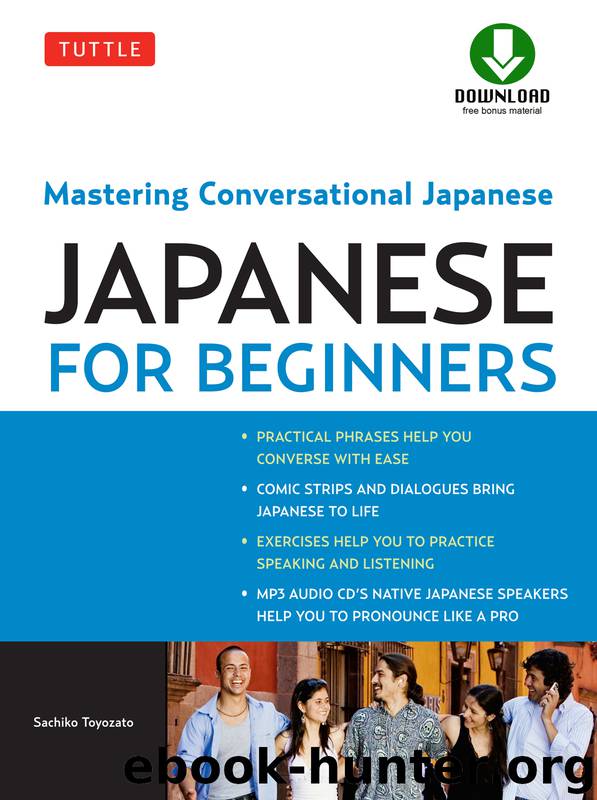Tuttle Japanese for Beginners by Sachiko Toyozato

Author:Sachiko Toyozato
Language: eng
Format: epub
ISBN: 978-4-8053-0906-3
Publisher: Tuttle Publishing
USING A QUESTION AS AN INVITATION
Asking a question using the Nai form of a verb with a rising intonation like Tenisu shinai? constitutes an invitation to someone. It means “Won’t you ___?” or “Why don’t we ___?”
Odoranai? Why don’t we dance?
Appuru pai tabenai? Won’t you have some apple pie?
Minna de bōringu shinai? Why don’t we all go bowling? (Chapter 10)
Some Expressions Unique to Japanese
Tadaima and okaeri (as in the “okaerinasai” at the beginning of this chapter’s dialogue) are Japanese expressions which have no English equivalents. Usually when returning home, Japanese people say Tadaima which implies “I’m back” or “I’m home.” The response to this expression is Okaeri or Okaerinasai, which can be translated as “Welcome home” or “I’m glad you’re home again.”
Similarly, when leaving home, an office, or a company, Itte kimasu or Itte mairimasu which corresponds to “goodbye” is used. (Literally these mean “I’m going and I’ll be back later.”). The person on the receiving side of these expressions says Itte rasshai or Itte rasshaimase, which literally means, “Please go and come back.”
In addition, there are also the expressions Itadakimasu and Gochisōsama which are said before and after a meal respectively. Itadakimasu is meant to show appreciation for the gift of food, while Gochisōsama implies “Thank you for a delicious meal.” Indeed, there are many common phrases which lose something in the process of translation.
Download
This site does not store any files on its server. We only index and link to content provided by other sites. Please contact the content providers to delete copyright contents if any and email us, we'll remove relevant links or contents immediately.
600 Basic Japanese Verbs by Hiro Japanese Center(968)
Vocabulary 4000 by Jeff Kolby(819)
Word Smart by Princeton Review(719)
Practice Makes Perfect English Articles and Determiners Up Close by Mark Lester(668)
Improve Your Word Power by Caroline Taggart(555)
Reader's Digest Use Your Words by Reader's Digest(518)
The Vocabulary Builder Workbook: Simple Lessons and Activities to Teach Yourself Over 1,400 Must-Know Words by Magoosh & Chris Lele(486)
Painless Spelling by Mary Elizabeth M.Ed(481)
The McGraw-Hill Desk Reference for Editors, Writers, and Proofreaders by K. D. Sullivan Merilee Eggleston(478)
Mastering Japanese Kanji by Glen Nolan Grant(467)
Collins Easy Learning English Spelling by Collins(439)
Tuttle Japanese for Beginners by Sachiko Toyozato(439)
Curious English Words and Phrases: The Truth behind the Expressions We Use by Max Cryer(393)
English Spelling by Collins(383)
Continuing Korean by King Ross & Ph. D. Jaehoon Yeon & Insun Lee(356)
30 Days to a More Powerful Vocabulary: The 500 Words You Need to Know to Transform Your Vocabulary… and Your Life by Dan Strutzel(345)
New Word A Day: Vocabulary and Riddles by Carruthers Elliot(338)
Watch Your Tongue by Mark Abley(333)
Mandarin Chinese for Beginners by Yi Ren & Xiayuan Liang(332)
